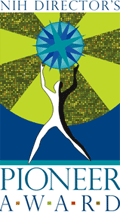As I noted in a previous post, NIH recently launched the Basic Behavioral and Social Science Opportunity Network (OppNet) and issued four funding opportunity announcements for the current fiscal year.
OppNet is now planning initiatives for future years. Key to this effort is obtaining input from all interested parties about current and emerging opportunities in basic behavioral and social sciences research that offer the greatest potential for improving health and well-being. Toward this end, OppNet has just released a request for information soliciting suggestions for both short-term (1-2 years) and long-term (3-5 years) activities, which can focus on humans or animal models.


 NIH has announced the 2010 competitions for the NIH Director’s Pioneer Awards and the NIH Director’s New Innovator Awards. These awards support exceptionally creative scientists who propose highly innovative—and often unconventional—approaches to major challenges in biomedical or behavioral research. Both programs are part of the
NIH has announced the 2010 competitions for the NIH Director’s Pioneer Awards and the NIH Director’s New Innovator Awards. These awards support exceptionally creative scientists who propose highly innovative—and often unconventional—approaches to major challenges in biomedical or behavioral research. Both programs are part of the 